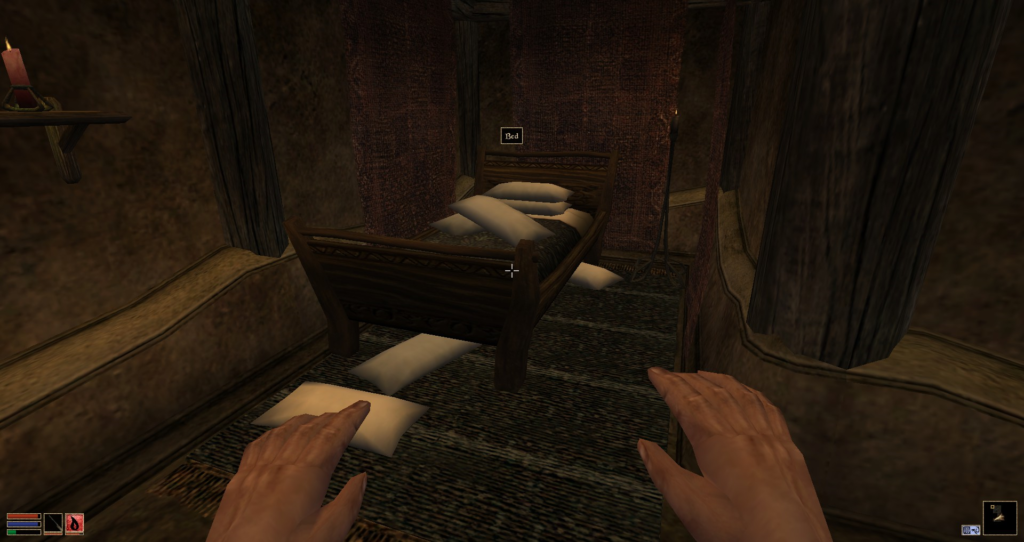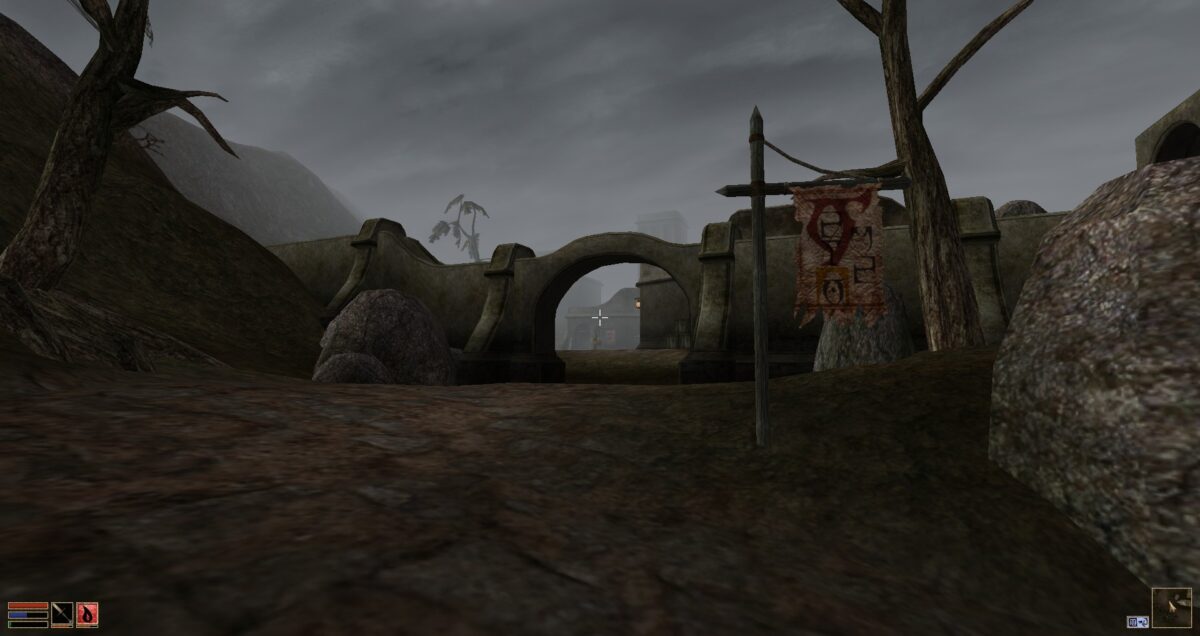Looking for the Quick Review?
There’s a trope in media called “Seinfeld Is Unfunny”. For most of its 11-season reign, Seinfeld was the biggest and most successful show on TV, and it served as a pioneer, inspiring a lot of the sitcoms and comedy series that came after it. Among TV fans, it’s a legend of a show. But to a growing audience of modern viewers, it’s not funny at all. You might be able to explain some of that effect away by noting that the experiences of a comedian in 1990s New York are unrelatable to today’s young adults, but I don’t know that they were much more relatable to my dad.
An alternative explanation is that subsequent series took so much from Seinfeld, building on that show’s successes, that returning to the original is boring by comparison. If you’ve seen everything that was inspired by Seinfeld, in a way, you’ve seen Seinfeld.
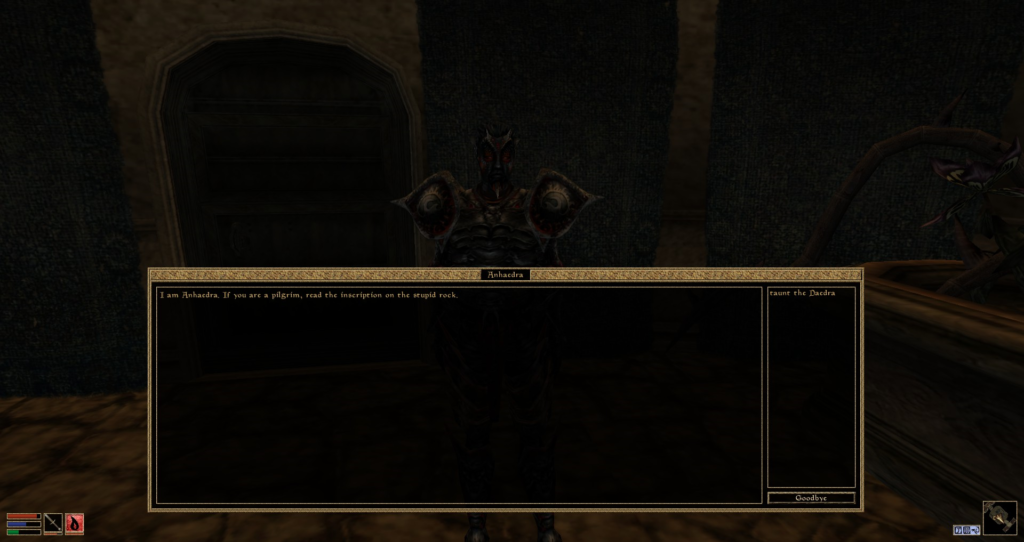
One of my most controversial (with some friends, sacrilegious) opinions is that this is how I felt reading the first Lord of the Rings book. I love fantasy, but reading The Fellowship of the Ring made me feel like I’d enjoyed it in the wrong order. I should have opened this book before other books, shows, and games made me intimately familiar with orcs and elves and wizards. Tolkien spends a lot of time and effort building a foundation for a world I already feel familiar with, because he was the first one to do it in the modern canon. As a result, when I make my way through his pages, that effort falls into the margins and my focus gets directed more to the long walks than the idea of dwarves and goblins. The Lord of the Rings was worse for me because it was familiar, but it was familiar because it had spent the better part of a century inspiring others.
That’s also how I feel about Morrowind. I played a ton of Oblivion circa 2008, and even more Skyrim from its 2011 launch going forward. Fans will point out that Morrowind has a unique design philosophy and does a lot of things differently than its successors, which is true; its old-school worldbuilding and storytelling aren’t emulated elsewhere in the series. But altogether, Morrowind doesn’t do enough to make up for the canyon-sized gameplay deficit. The newer games just do so much better that it’s hard to focus on the few things they might do worse.
If I had played Morrowind when it first came out, I probably would have hated it even more then, because I was seven. But if I had been older and able to experience this game a full four years before Oblivion, I bet I would have been amazed. The environments, the storytelling, the depth. I would have poured hours into alchemy and magic and developing all of my skills. If I’d had all the time in the world and access to a limited supply of newer games, Morrowind might have been one of the best things that could have happened to me.
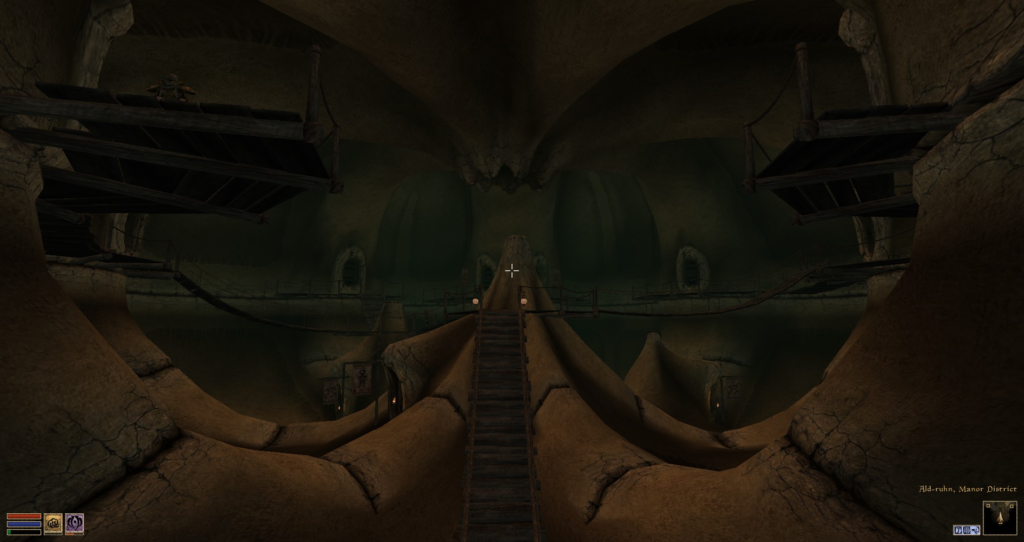
But as it is, playing Morrowind in 2021 is a mixed bag. It’s the sort of game I play and think, “man, this is a really solid foundation. If they could just change some things in the next update…”. But Morrowind is 19 years old. By all accounts, Bethesda isn’t ready to put their development teams to work on Skyrim‘s sequel, much less its predecessor’s predecessor. There is no next update.
For some, the answer to that problem is mods. Even in 2002, Bethesda RPGs earned a reputation of extreme mod-friendliness, and for the communities that love them, if you don’t like something, the best solution is often to change it with a mod. For some gameplay features, that’s fair; Fallout and Elder Scrolls games often launch with a bunch of bugs in tow, and fans of each one usually compile an unofficial patch designed to scrub them out. For my playthrough, I used OpenMW, a client that polishes some of the code and optimizes the game better for modern machines.
Other mods target outdated gameplay features, like Morrowind‘s infamous dice-roll combat. In short, Morrowind as a game takes more from old-school tabletop RPGs than most of its successors, including a method of determining the success of an action by rolling a pair of dice. In Dungeons and Dragons, rolling dice to figure out whether or not your sword slash makes contact with a monster is fair and, if played right, exhilarating. In Morrowind, where you might walk right up to an enemy and watch the blade sink in, it’s not.
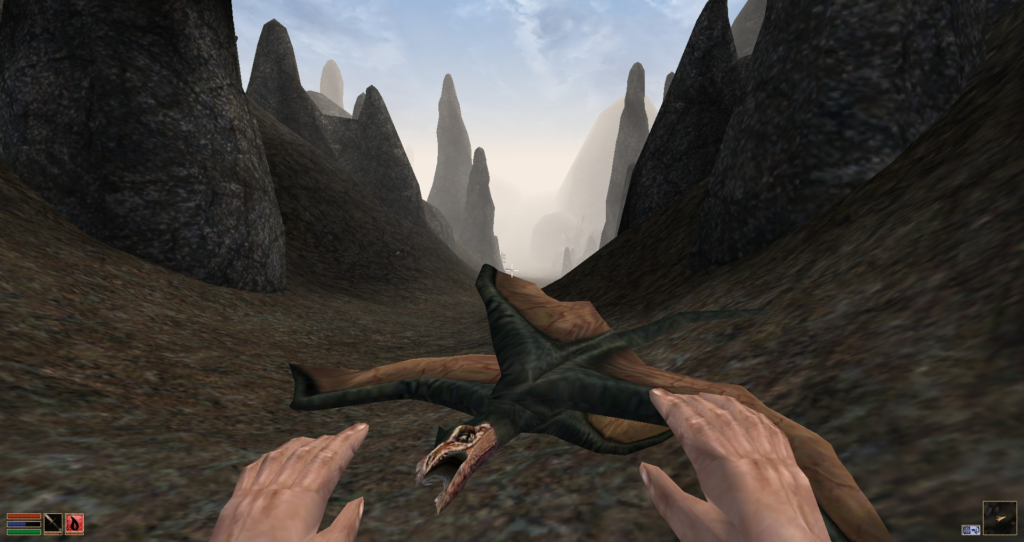
This is probably the number one concern I’d heard going into Morrowind: it’s annoying, and a chore, to be toe-to-toe with an enemy, attack them over and over with your longsword, and have the game tell you you just missed six times in a row. Luckily, modders will point out, you can mod that; you can change the game so every attack hits, no matter what.
But now you’ve got a new problem: the game wasn’t designed for every attack to hit. Attacks in Morrowind stagger opponents, and if every attack staggers your opponent and every attack is guaranteed to hit, you can rapid-whack every enemy until they die without worrying at all for your own safety.
Similarly, other mods tackle Morrowind‘s weird magic system, where magicka, the limited resource that governs magic use, does not naturally replenish over time. Casting spells depletes your magicka gauge, and you’ll need to either consume potions or take a nap to regain it. Magicka potions, while not necessarily rare, can be difficult to find or purchase in sufficient quantities, meaning any self-respecting mage is going to have to invest significantly in alchemy. Of course, there’s always the napping, but that requires either that you have access to a nearby bed or that you’re willing to take your chances snoozing in the wild where enemies can ambush you and disrupt your slumber. And that’s assuming you can find a spot to sleep – if enemies are nearby to begin with, that’s a no-go. It’s potions for you.
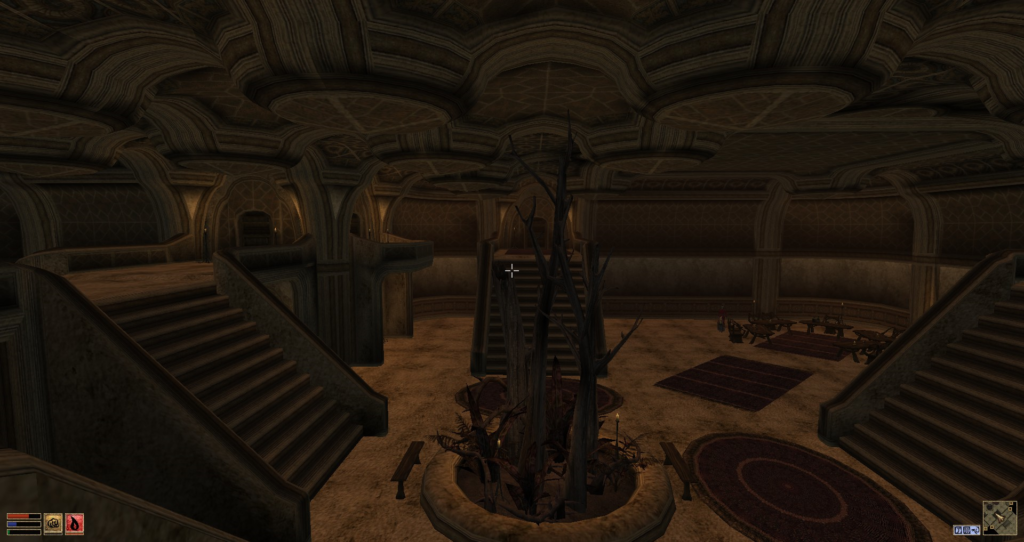
Of course, like the game’s awkward combat, modders have a solution: mods that introduce regenerating magicka (a la Oblivion, Skyrim, and just about every other game with a mana system). But, again, just like those combat overhauls, Morrowind wasn’t designed to have regenerating mana, so adding it threatens to break up the existing balance of the game (hardcore fans might balk at the idea that Morrowind is balanced to begin with, but y’all know what I mean).
Morrowind‘s core strength is its world. From the time you step off the boat in Seyda Neen, everything in Vvardenfell is weird, intriguing, and enticing. This is a bizarre place that eschews common fantasy conventions, which makes every corner of the island feel like a new mystery. Sure, most of these mysteries are tinted either tan or beige, but they’re mysterious all the same. From fetid swamps and deep lava canyons to ash-strewn plains and cities where houses are carved from giant mushrooms. These landscapes are dotted with European-style Imperial villages, native dark elf towns that blend East Asian influences with the otherworldly, and daedra ruins that go all-in on the demonic. Vvardenfell’s dungeon aesthetics run from traditional dark elf ancestral tombs to steampunk dwarven factories. There’s a lot to experience; it’s varied, and each new location discovered feels like a piece of the uncomfortable mystery that is Vvardenfell.
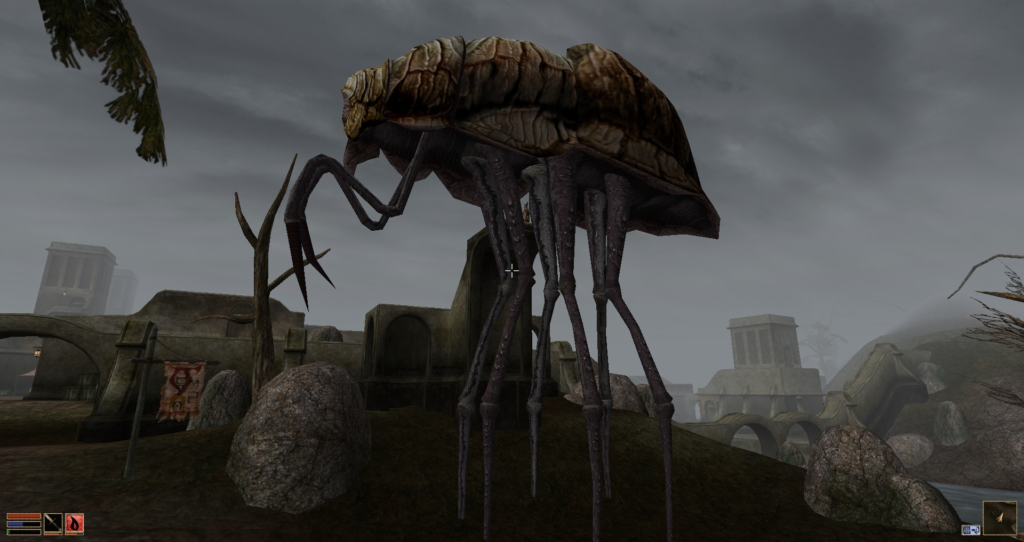
Mystery is a theme that runs deep through Morrowind. Where Oblivion tells you straight away that the daedra lord Mehrunes Dagon is trying to invade Cyrodiil with his demon portals and your job is to stop him, and where Skyrim introduces the player immediately to the dragon Alduin and his goal of resurrecting all of Skyrim‘s dragons, Morrowind is a much slower burn. Your closest tether to the main quest, Imperial Blades member Caius Cosades, doesn’t even get close to telling you what you’re there for until several (relatively long) quests in. The initial dip into Morrowind is uneasy; that’s exactly how it’s supposed to feel, and the game pulls it off flawlessly.
I felt like I wasn’t supposed to be in Morrowind. Of course, it doesn’t help that its native Dark Elves often make clear that they feel the same way. Unless you count yourself among their ranks, you’re an Outlander, and to many, Outlanders don’t belong in Morrowind, much less the island of Vvardenfell. So every step into a new mysterious village or tomb felt like one I had to take cautiously. I wasn’t a welcomed guest. I was an intruder, walking in on a conspiracy far deeper than myself.
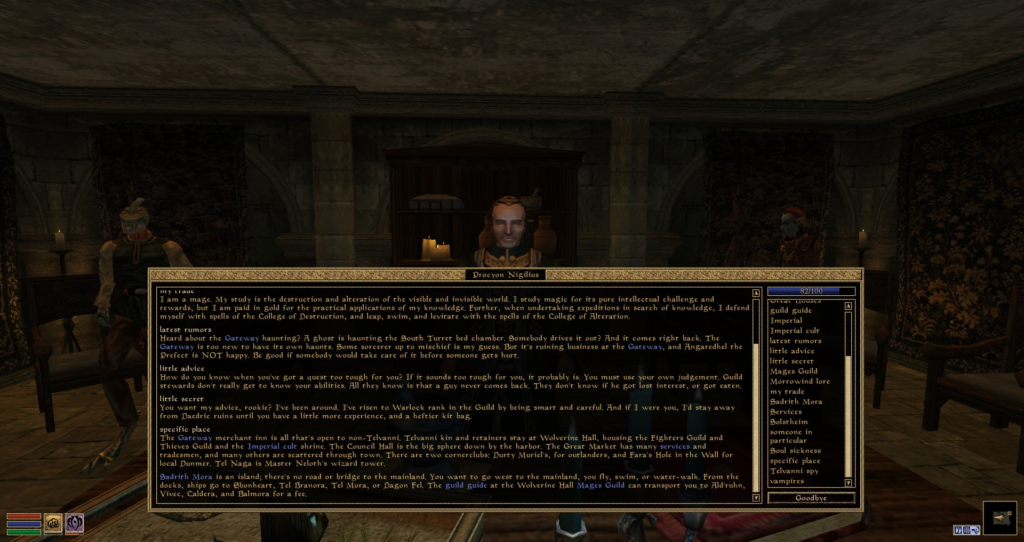
And the way you uncover that conspiracy can be genuinely interesting. Morrowind‘s conversation system is far more complex than its successors, something better resembling an old-school wiki than the simple dialogue windows of Oblivion. You can ask anyone about nearly anything, and asking the right questions to the right people will be rewarding.
…but there are way too many questions to ask. The more topics you discover, the more you can ask about, and while the people of Morrowind have something to say about nearly all of them, most of them say the same three or four things. At best, it’s mildly annoying; the list of topics is clogged, but not so much so that you can’t find what you want to talk about. At worst, it’s immersion breaking; racist barfighters and seasoned criminals open conversations with a hidey-ho! attitude they share with merchants and commoners. If I had a septim for every time a stranger asked me if I wanted advice only to turn around and tell me they don’t like me because they’re racist. Joke’s on me, I guess.
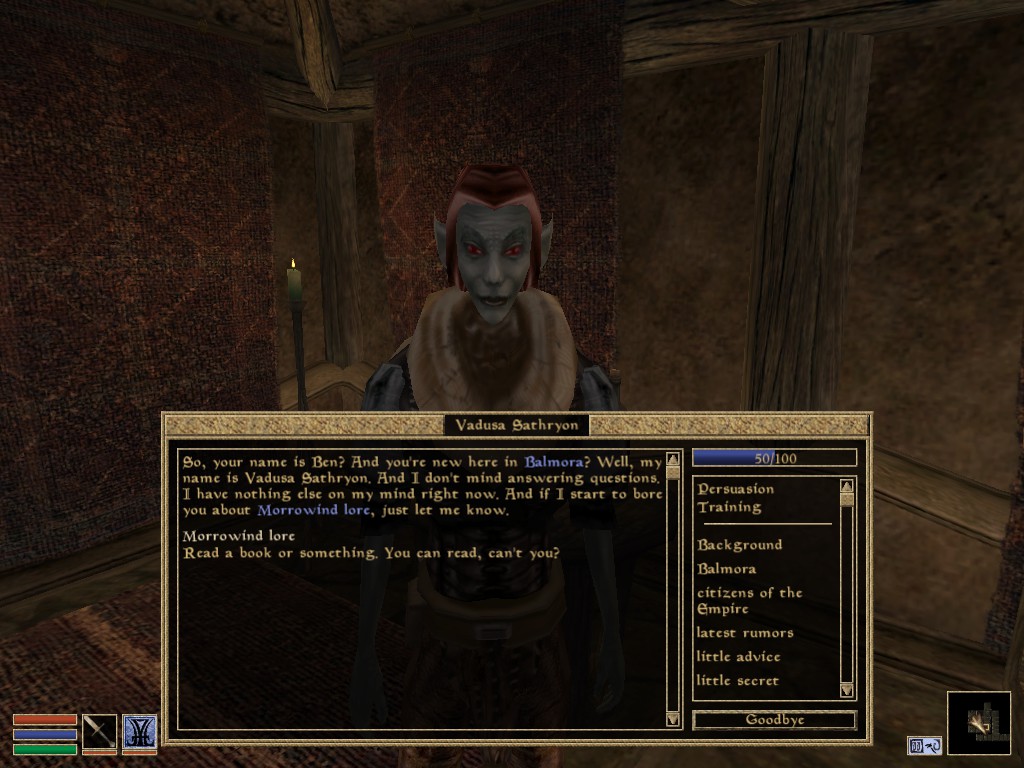
As an unabashed Wikipedia addict, I actually don’t at all dislike the commitment to a Wiki style of text-based storytelling. But if that’s what you’re committing to, you’ve got to commit. Many of the conversation topics come with somewhere between one and three answers shared by every NPC in the game. It’s fluff meant to pad out the world without actually filling it, and it’s obvious almost immediately. Add in that cities are littered with extraneous NPCs who seem to have nothing of value to say, and the problem expands on itself — to be clear, it’s not that these are empty shells who say nothing, a la The Witcher; the game presents them as potentially-valuable conversation partners with a ton of dialogue options. It’s just that none of them are worth clicking.
Morrowind is an old game. When it came out in 2002, my brain was still trying to work through the complexities of Freddi Fish and the concept of multiplication. Like me, video games had some growing to do. In the early 2000s, computer RPGs were still trying to separate themselves from their pen and paper ancestors, and design elements like Morrowind’s dice roll combat are an enduring example of that. But as much as they’re struggling to find a niche in the realm of computer gaming, they’re also locked in a struggle with computers themselves.
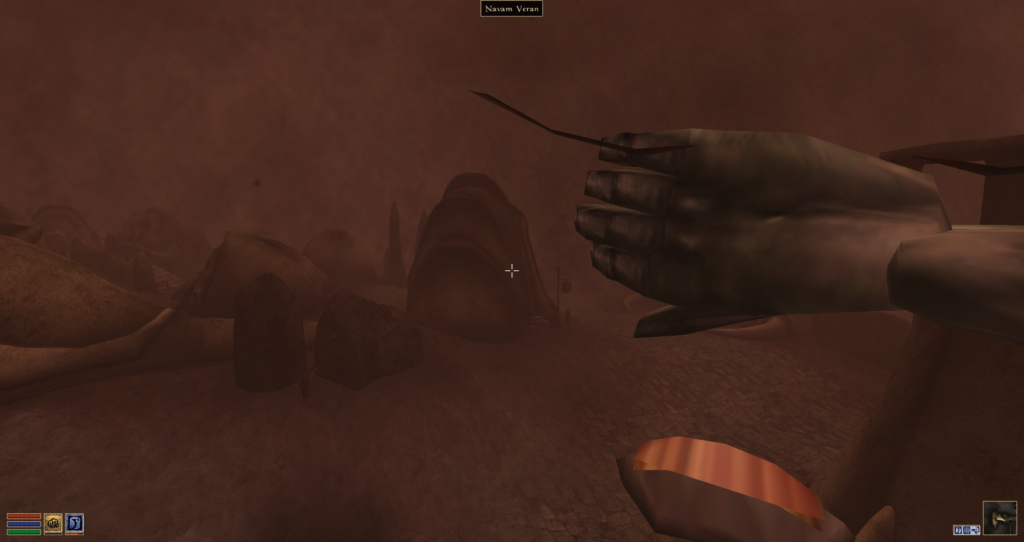
For a piece of ancient history, Morrowind runs surprisingly well, but it bears the burden of its age all over. Vvardenfell experiences a variety of weather, from sunshine to rain showers to ash storms, but through all of it, the island is covered by a dense layer of fog. Vvardenfell is huge by 2002 standards, and still pretty damn big by today’s standards. Filling that space with as much content as the developers did and keeping it loaded from horizon to horizon would turn contemporary computers to ash. Cyber cafes would start to resemble Ald’ruhn. As a result, what’s on the screen at any given time is limited, even on today’s machines. I’m sure mods can amend this, but it’s worth noting that, just like regenerating magicka and combat dice rolls, the fog is there by design, and being able to notice that some of the game’s distant cities are actually right next door to each other might take something away from the experience.
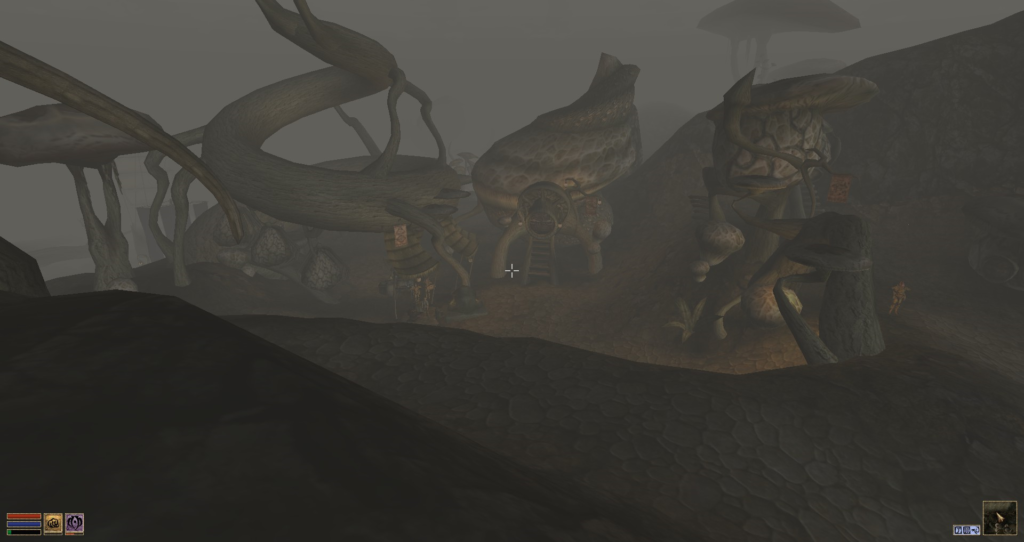
The fog helps when you’re trying to keep the four cliff racers and two bandits in this map cell loaded separately from the four guar and three rats in the next, but what if you want to build an impressively large city? Luckily, Bethesda has us covered there, too, in that the city of Vivec is just that… covered. Where the fog is something I got used to almost immediately, Vivec is decidedly dissimilar. In order to create a massive city without grinding the game to a halt on older hardware, Vivec’s spaces were separated significantly. The city itself is separated into a number of cantons, which are less organic-feeling districts and more huge floating buildings. Each of these cantons is then divided into several enclosed spaces. Traversing them is a chore.
I could sprint around the city, of course; the lack of hostile creatures means it’s not as important to maintain my stamina in case of sudden combat. I thought that, too. Then I learned that’s not quite how Morrowind works. The stamina system governs mobility and combat, but it also governs… just about everything else. Trying to convince someone to trust you or to believe a lie? There’s a stamina dice roll behind that. Want to sell or buy something? Check your stamina — if you’re tired, the prices won’t be in your favor. Picking a lock? Better catch your breath first. What about magic? Surely that’s governed by magicka entirely, correct? Obviously not, idiot. The default walking speed in Morrowind is so mind-numbingly slow that I made sure to load up a podcast or YouTube video for long journeys. Sprinting (running) and jumping/bunny hopping expedite the process, but at the cost of just about every other mechanic in the game. At best, it’s annoying. At worst, infuriating. The wide open spaces of Vvardenfell make running feel like a necessity, and the game punishes you for indulging it.
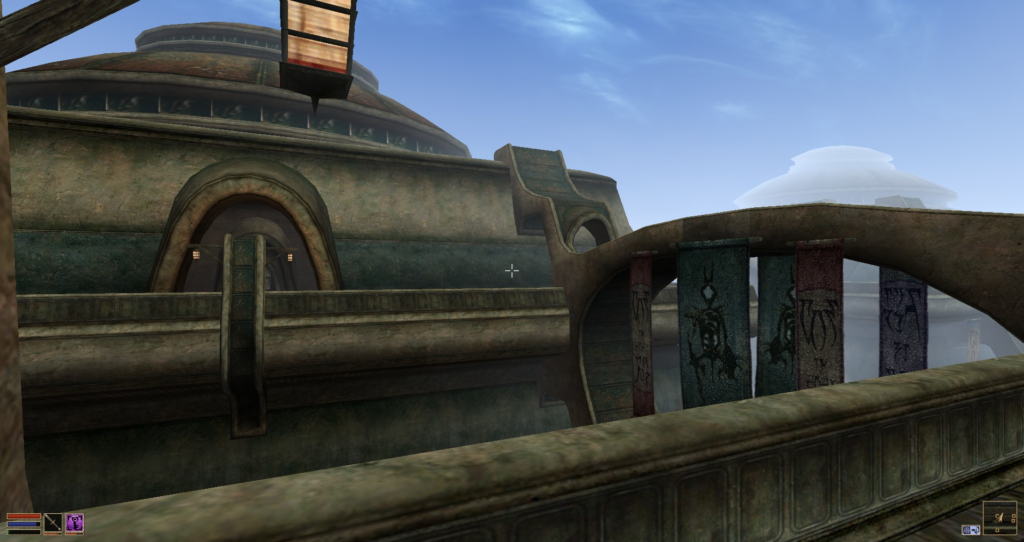
The best thing that happened to me in the city of Vivec was my decision to make an offering to an altar that rewarded me with 60 minutes of levitation. Suddenly, I could make my way around the city without engaging in the slow and repetitive series of ascents and descents that are otherwise necessary. I tried to pack as many quests and objectives into this 60-minute period as possible. It was an hour of accessibility that changed the face of the game for me. This was the mobility that Morrowind could have been born with — at least speed-wise. Sure, it would make long, perilous walks through the ashlands less tense and exciting, but being able to walk from one side of a village to the other in under five minutes might have been nice.
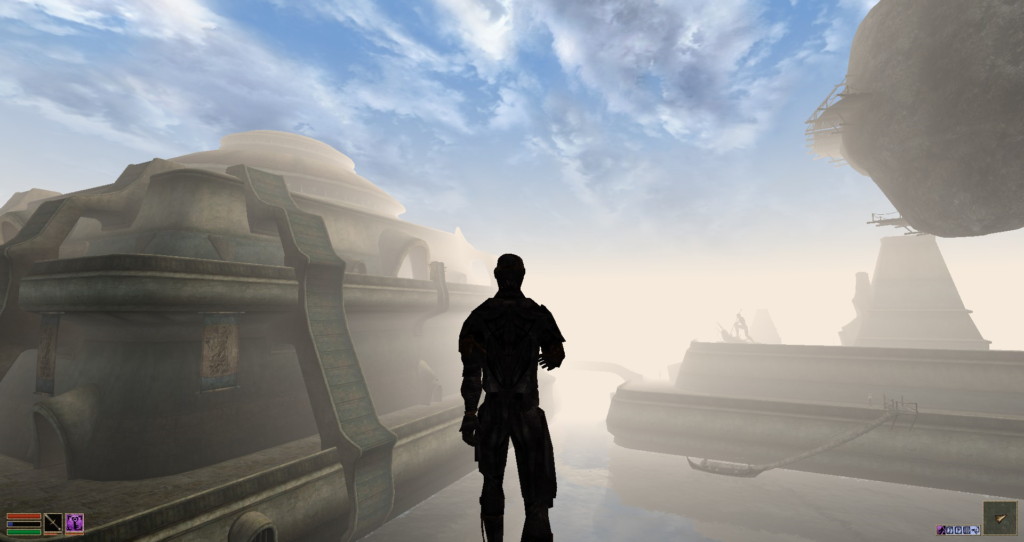
This is one thing I really love about Morrowind’s gameplay design: for all its flaws with magicka the resource, magic abilities themselves open up the game to limitless possibilities and really challenge the player to find fun and unique ways to approach a situation. Morrowind isn’t afraid to give you the power to fly over mountains future games will cover with invisible walls. It won’t force you to swim in dangerous oceans that could easily be water-walked over. And if someone’s standing in the way of a chest you need into, investing time in becoming an astute wizard will pay off in the form of Chameleon and Unlocking spells. Any spell that isn’t powerful enough or properly-calibrated can be retooled at a spellcrafter for a price. Morrowind‘s magic spellcrafting is a big risk in terms of the effect it can have on gameplay. In action, it’s an even bigger win.
Other design flaws probably fit more in the realm of bugs (in a Bethesda game? Controversial!). Unofficial patches and third-party clients like OpenMW will fix some or most of these. But some are deeper in the game’s code. I accepted one quest from a member of the Thieves’ Guild in Ald’ruhn to steal something from that city’s chapter of the Mages’ Guild. Was I going to follow through with it? Maybe. Did I at least want the option? Of course! Imagine my surprise when I walked in the front door of the Guild to be labeled a thief and immediately magic-assaulted by an overzealous wizard. There was no way around this. I had stolen nothing, but the game narc’d on me all the same.
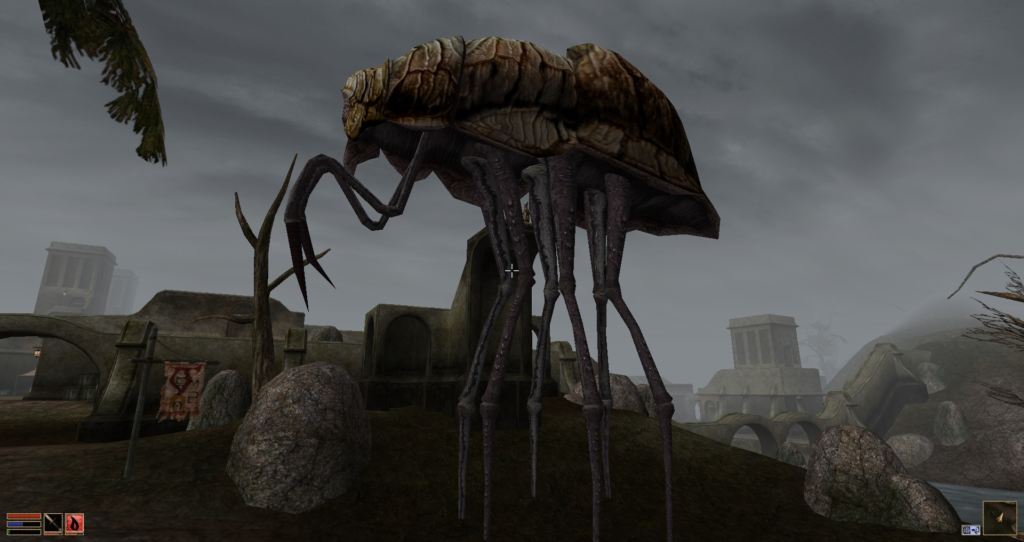
Then, outside the realm of petty flaws are purposeful design-decisions that I wish I could call bugs. Chief among these in my experience were permanent or lasting debuffs. One of the last things I experienced in Morrowind before stepping away was a crypt battle with a bonewalker. Fans of the game already know where I’m going with this. They might be giggling. About a minute into my epic fight with this hulk of a zombie, I found I couldn’t move anymore. I was rooted in place. Okay, I reasoned, this isn’t like Skyrim, but that’s okay. It’s just a different kind of challenge. I figured that I’d regain the ability to move over time. When I didn’t, I opened my bag and chugged a potion to heal any diseases I’d contracted. Still nope. It turns out this casual enemy has the ability to completely deplete my strength and endurance, lowering my maximum item carry weight to 0 pounds and forcing me to teleport back to the nearest temple (far away), drop everything I own, and pray at an altar to restore my stats to normal.
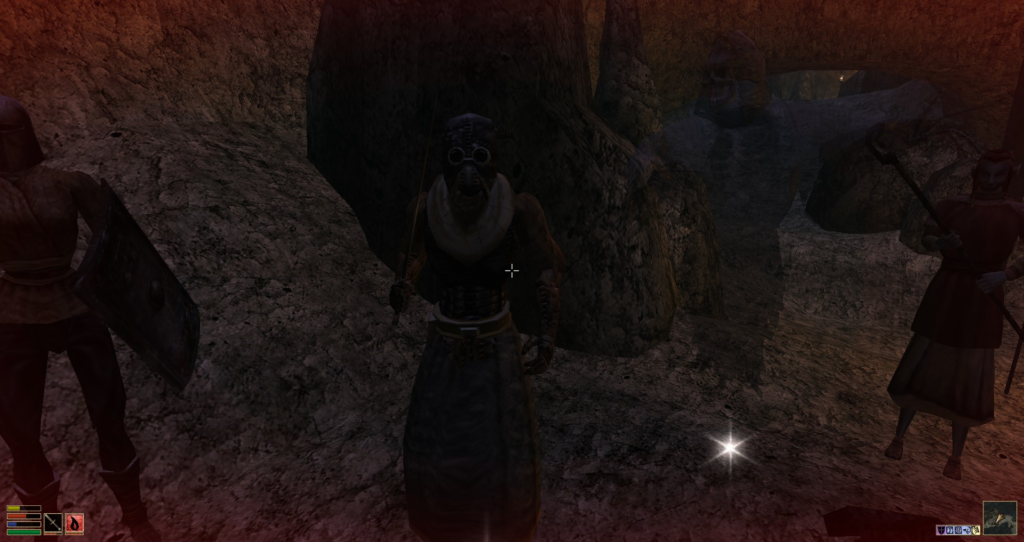
I don’t actually hate effects like these. Most of the standing members of the game’s community seem to be of the mindset that these experiences add to the game, requiring players to either come prepared or face the consequences (which are cumbersome, but not impossible to overcome). As I stood, overencumbered and motionless in that tomb, I waffled between the, at times equally-viable, options of going through the ascribed motions, cheating to restore my stats, and quitting the game completely and moving on to Oblivion.
To a lot of hardcore Morrowind fans, being unable or uninterested in continuing after a setback like this is a sign of weakness — this is the game they’d signed up for, and we did too, they allege. But… I didn’t really sign up for this. I wanted to play through Morrowind, sure, but the further and further I got into the game, the more and more my faith in it faltered. Much like my strength stat, my interest in continuing was drained.
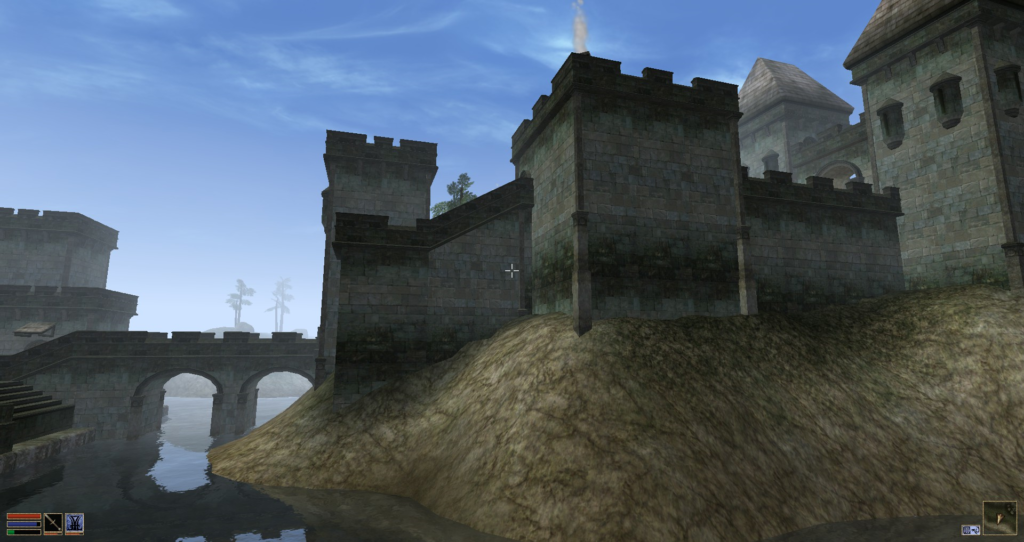
Morrowind isn’t a bad game. It’s an impressive accomplishment of early (by my standards) game design that bears all the hallmarks of its time, both positive and negative.
I think one thing we often misunderstand about gaming is that, as with many parts of our lives, our preferences are shaped by the times in which we were raised. People who loved Morrowind in 2002 and still love it now often sing grand praises of a game that refuses to hold your hand, that relies on the player to figure out the world, to sink or swim at their own pleasure, and to deal with harsh consequences. For these folks, subsequent titles in both the Elder Scrolls series and gaming in general have felt lacking. To a lot of newer players, games like Skyrim doing away with all the early-game intensity and creating a more welcoming experience are partially responsible for ushering them into roleplaying games.
I’m somewhere in the middle. I delved cautiously into Morrowind, having heard more loudly the voices of its detractors than its fans. I knew I wanted to pull back the curtain on one of the earlier Elder Scrolls titles, and when I did, what I found pleasantly surprised me. I enjoyed the experience of exploring the world on my own more than I thought I would. Not having my eyes eternally glued to a compass allowed me to take in more of the world around me, even if that world was painted primarily in six shades of gray. For me, delving into this game that bears those hallmarks of its old age was refreshing, at least until it wasn’t.
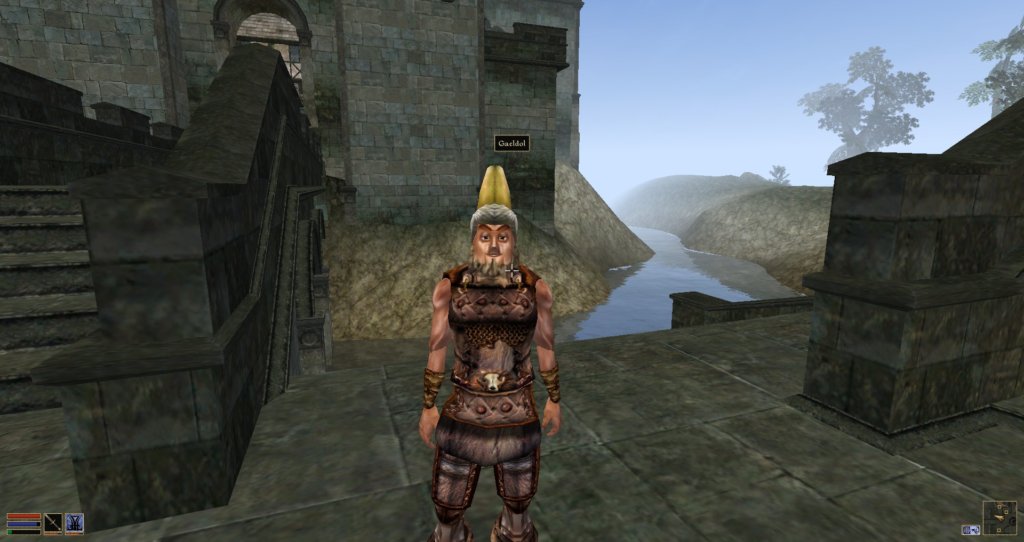
Morrowind is a taxing game. It’s not realistic to look at it as a slightly different RPG. It’s not enough to acclimate yourself to a few features, like the lack of a compass and no regenerating mana, and play as normal. If you’re a new player like me and you want to get the most out of this game, you’re going to be constantly learning. If you have one or two hundred hours at your disposal, you might be able to do it all organically and enjoy the experience. If you don’t, you’re going to be Googling a lot. You’re going to want to know if there’s any way to make that mana regenerate (there isn’t), you’re going to want to know if you’ve gone crazy searching for a Bind Swortshord Spell (you haven’t; it doesn’t exist), and when your Strength stat drops to 0 and stays there even after you’ve taken a Cure Disease potion, you’re going to want to know what did that. And then the hardcore fans on the internet are going to let you know that you should have known better.
And if you want to continue in Morrowind, they’re right. It’s the only mindset that works in this game. You have to know better. But I’ve been playing for weeks now. I have a Trello board set up to organize my quest goals. My computer starts chugging from all the Chrome tabs I leave open trying to figure out enchanting, spellmaking, and navigating Vvardenfell. And I still know so little.
There are always ways to learn more, and if I put forth the time and energy, I’m sure I could soak it all up and fully embrace this game. But that’s my problem. That’s time and energy I don’t have. At the start of 2020, one of my goals was to take in as much new media as I could; to read more, to watch more, to play more. I enjoyed pursuing this goal, and I brought it with me into 2021. The Witcher 3 killed two months last year, and I loved it. If I want to get the most out of Morrowind, it’s going to kill way more. And the more I compare it to my time with The Witcher, the less I feel attached to Vvardenfell. There’s a great game underneath all of this, but the more I dig, the more I realize I don’t have the time or energy to reach it.
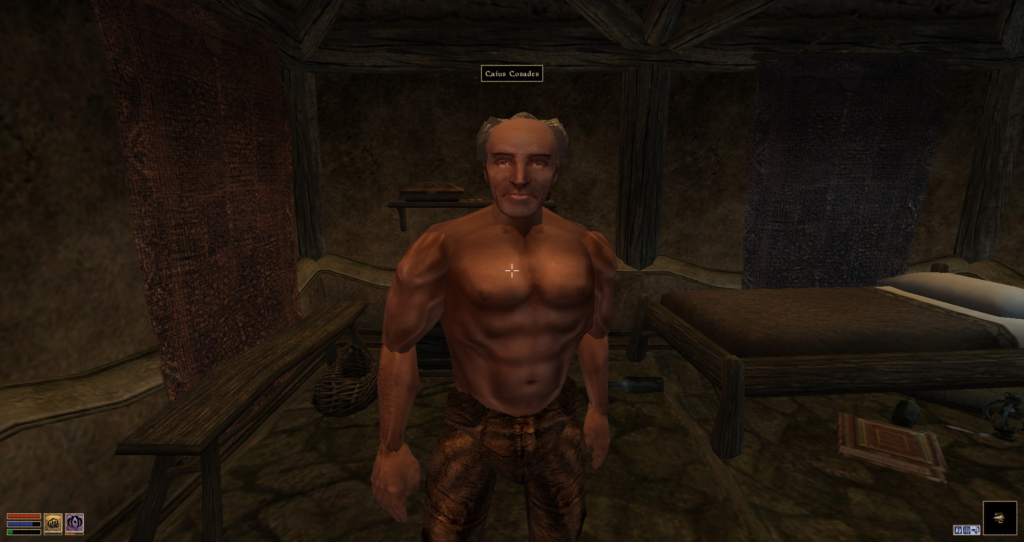
Quick Review
Game: Morrowind
Developer: Bethesda Game Studios
Published by: Bethesda Softworks
Available for: Windows PC, Xbox
CONTENT
Microtransactions: None
Tedium: Moving around and adjusting to old features can be time-consuming.
Violence: What counted for “graphic violence” in 2002
Content: Violence, coarse language, infrequent descriptions of sexual violence
FEATURES
- Legitimately fascinating and engrossing world that eschews convention in favor of mystery
- Classical approach to questing and storytelling without compasses and visual direction indicators
- Varied roleplaying possibilities through game-altering skills and a dynamic spellcrafting system
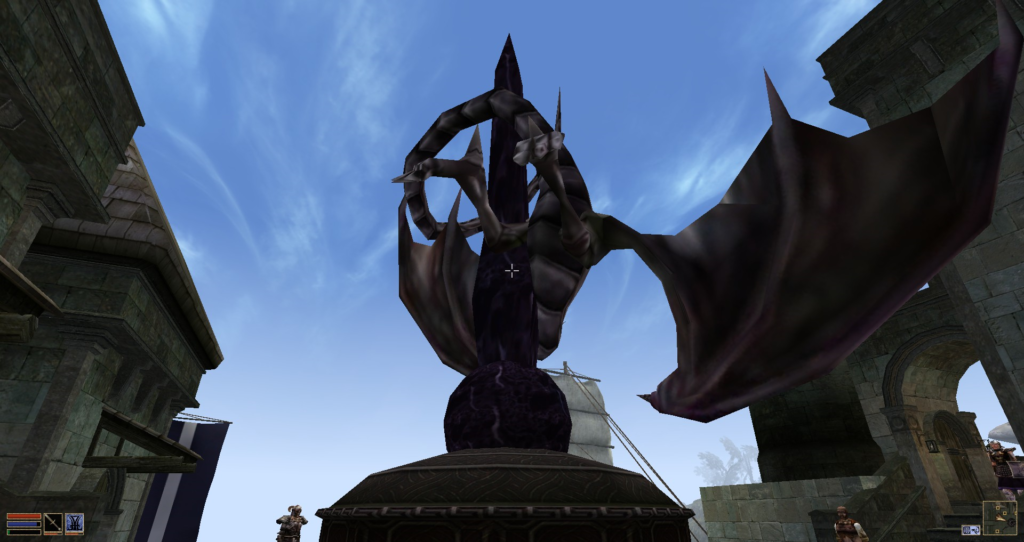
WHAT I LIKED
- Fascinating world
- Magical combat was a step in the right direction
- Unique approach to storytelling and in-game mysteries
- The imperfect graphical style is still surprisingly attractive nearly 20 years later. Pour one out for Oblivion.
CONCERNS
- An old game that feels like an old game. Many mechanics are out-of-date and fixing them in a non-gamebreaking way can be a chore.
- Dialogue and story acquisition are slow.
- Punishing gameplay can mean hours of backtracking for the unprepared.
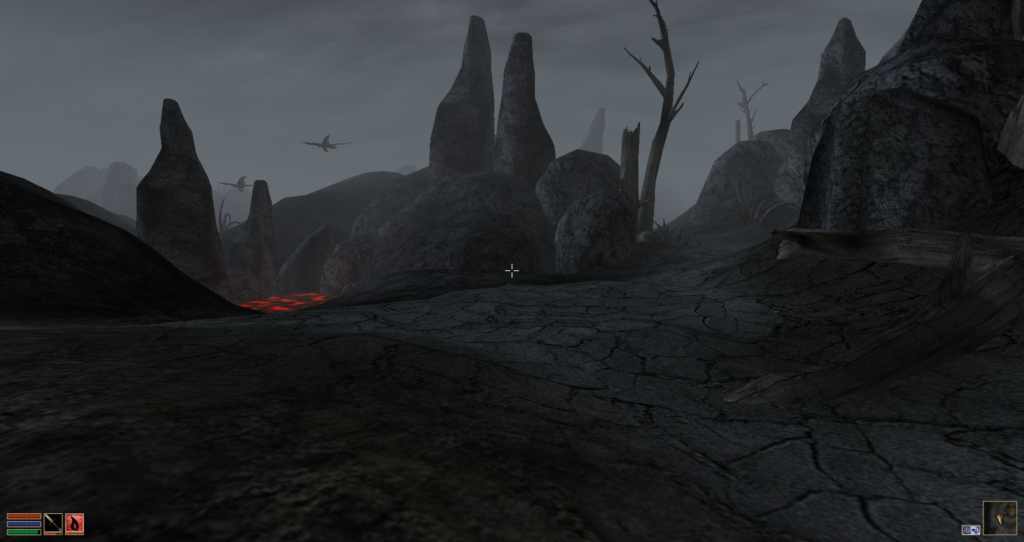
WHO’S IT FOR?
If you’re a fan of old-school RPGs that throw away modern hand-holding mechanics in favor of a more immersive world, and you figure you can exempt some old-timey (and time-consuming) quirks in the interest of a rewarding story and worthwhile magic mechanics, Morrowind is worth a try.
Conversely, if you’re a fan of games like Skyrim and dislike the idea of a game that’s quirkier or more complicated, if you like your games polished and modern, or if you hate complex, open-world RPGs altogether, this is probably one worth skipping.
